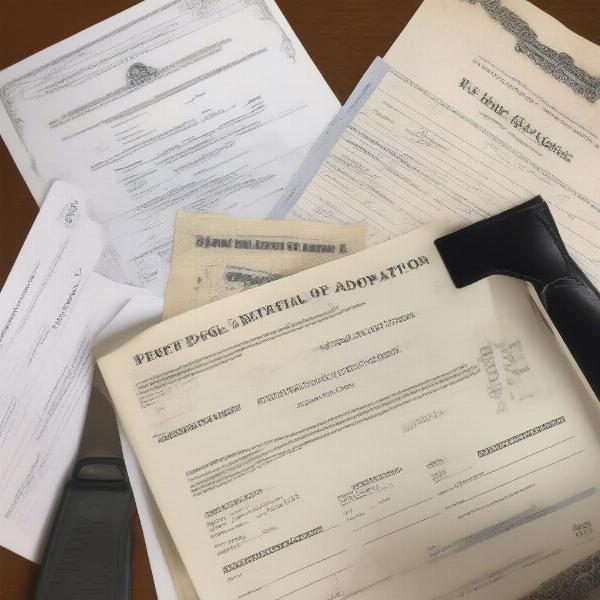A dog’s birth certificate isn’t quite the same as a human’s. While it doesn’t legally prove ownership like a pet license, it provides valuable information about your dog’s lineage and history. Understanding what a dog birth certificate is, what information it contains, and why it matters can be beneficial for any dog owner. This article will delve into the intricacies of dog birth certificates, answering common questions and offering practical insights for both new and experienced dog owners.
A dog birth certificate is essentially a pedigree document. It outlines your dog’s family tree, tracing back several generations. This document is typically issued by kennel clubs or breed registries. It signifies that your dog’s parents were registered purebreds and adheres to specific breed standards. However, it’s important to remember that a birth certificate does not guarantee a dog’s health or temperament. It solely focuses on lineage. Understanding this distinction is crucial for prospective dog owners.
What Information Does a Dog Birth Certificate Contain?
A typical dog birth certificate will contain a wealth of information about your dog’s background. This generally includes:
- Registered Name and Number: Your dog’s official name within the registry and a unique identification number.
- Breed: Confirmation of your dog’s purebred status and specific breed.
- Date of Birth: Your dog’s birthday.
- Sex: Male or female.
- Color and Markings: A detailed description of your dog’s physical characteristics.
- Sire and Dam: The registered names and numbers of the father (sire) and mother (dam).
- Breeder Information: The name and contact information of the breeder.
- Registry Information: The name and logo of the issuing kennel club or registry.
Why is a Dog Birth Certificate Important?
While not legally mandatory, a dog birth certificate can be valuable for various reasons:
- Proof of Pedigree: It confirms your dog’s purebred status and lineage, which is essential for showing or breeding.
- Breeding Purposes: A birth certificate is necessary for registering offspring with kennel clubs. It helps maintain breed standards and ensures responsible breeding practices.
- Understanding Health Predispositions: Knowing your dog’s lineage can provide insights into potential health issues common to the breed, allowing for proactive health management.
- Historical Value: It offers a glimpse into your dog’s family history, which can be interesting for owners curious about their dog’s background.
Is a Dog Birth Certificate the Same as Ownership Papers?
This is a common misconception. A dog birth certificate, or pedigree, does not legally prove ownership. Pet licenses, microchips, and adoption papers are the legal documents establishing ownership. While a birth certificate verifies lineage, it doesn’t confirm who owns the dog. Think of it like a family tree – it shows your ancestry but doesn’t prove you own your family home.
 Dog Ownership Documents
Dog Ownership Documents
How to Obtain a Dog Birth Certificate
If you’re purchasing a puppy from a reputable breeder, they should provide you with the birth certificate. It’s crucial to confirm this before completing the purchase. If you’ve adopted a dog and are curious about their lineage, DNA testing can provide some insight, though it may not lead to an official birth certificate if the dog’s parents weren’t registered.
Do All Dogs Have Birth Certificates?
No, only purebred dogs registered with a kennel club or breed registry have birth certificates. Mixed breed dogs, while equally deserving of love and care, do not have pedigrees and therefore won’t have birth certificates. This doesn’t diminish their value as companions.
Conclusion
Understanding the purpose and limitations of a dog birth certificate is essential for responsible dog ownership. While it’s a valuable document for proving pedigree and informing breeding decisions, it doesn’t replace legal ownership documentation. Whether your dog has a detailed family tree or a mysterious past, the bond you share is what truly matters.
FAQ
- Do I need a dog birth certificate to get my dog a pet license? No, pet licenses are issued based on ownership, not pedigree.
- Can I register my dog with a kennel club if I don’t have a birth certificate? This is generally difficult unless you can prove the dog’s parentage through other documentation.
- What if my dog’s birth certificate is lost? Contact the issuing kennel club or registry for information on obtaining a replacement.
- Does a birth certificate guarantee a healthy dog? No, a birth certificate focuses on lineage, not health. Regular veterinary checkups are crucial for ensuring your dog’s well-being.
- Is it worth getting a dog birth certificate if I’m not planning to breed or show my dog? It depends on your personal preference. Some owners appreciate having the historical information, while others may not find it necessary.
- Can a dog birth certificate tell me about my dog’s temperament? No, temperament is influenced by a variety of factors, including genetics, environment, and training.
- What are the reputable kennel clubs that issue dog birth certificates? Some well-known examples include the American Kennel Club (AKC), the United Kennel Club (UKC), and The Kennel Club (UK).
Related Articles
About ILM Dog: ILM Dog is your trusted international resource for all things canine. We offer expert advice on a wide range of topics, from choosing the right breed to understanding dog health, nutrition, training, grooming, and finding the perfect products and accessories. We are committed to providing accurate, practical, and up-to-date information to help you provide the best possible care for your furry friend. For any inquiries, contact us at [email protected] or call us at +44 20-3965-8624.